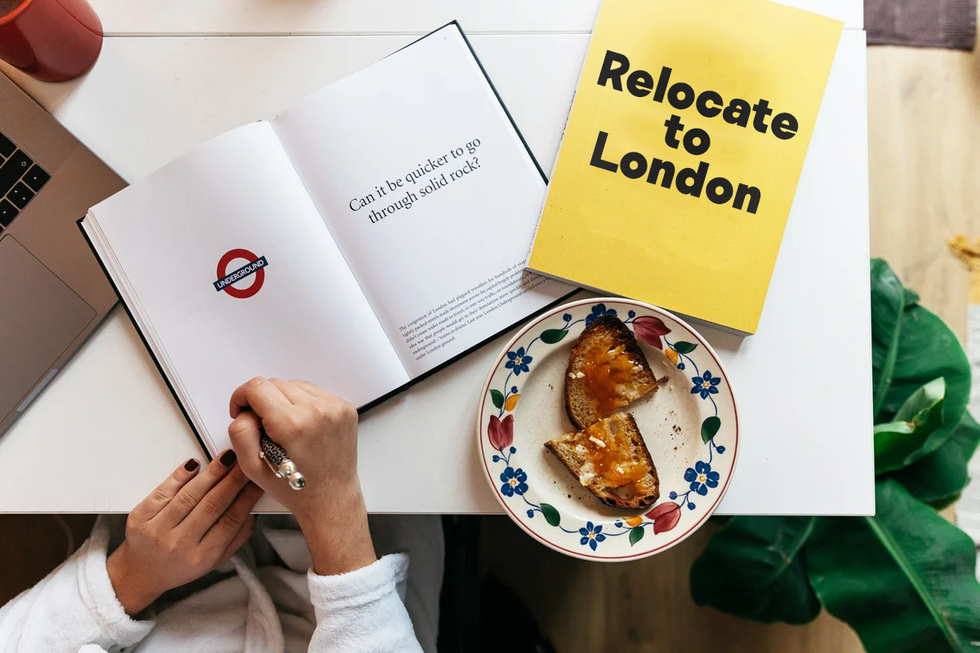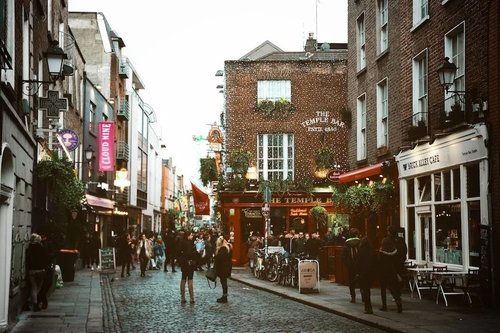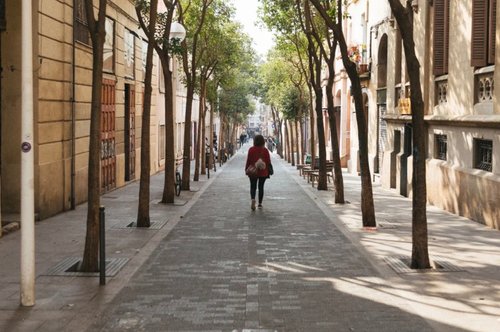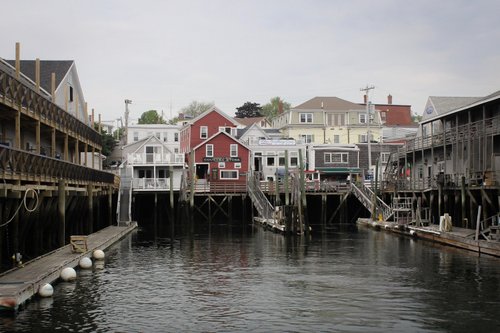Working in London
07 juin 2022
6min


Journalist
Eight years ago, I was a young Canadian looking for a new adventure. I found it in Britain’s capital. At the time, I thought I would spend a year or two studying and working in the big smoke. Then I’d be off on the trail of new experiences – yet I’m still here. That’s because you could spend a lifetime exploring London and still not get bored. It’s one of the world’s most diverse cities and it offers a wealth of career opportunities. With the worst part of the pandemic (hopefully) behind us, few cities anywhere offer more in the way of culture, cuisine, and nightlife.
The job market
London is the biggest urban economy in Europe but the UK has faced a few hiccups over the past few years. First there was “Brexit” – the word used to describe Britain’s departure from the European Union. That consumed a few years, only to be followed by the pandemic, which has caused further uncertainty, not least in recruitment. But things are improving and the job market is once again looking strong. This year has seen a record number of job openings being advertised as the hunt for talent soars. As law firms and financial institutions have struggled to fill vacancies, those in demand are commanding pay increases too. So, for example, financial services workers in the City of London who changed jobs enjoyed a pay rise of 22% in the first quarter of 2022, according to recruiter Morgan McKinley’s London Employment Monitor. London is home to 18 universities such as the prestigious Imperial College as well as the London School of Economics.
The working week
As in many major cities, the working week is Monday to Friday for most people. However, Londoners enjoy shorter working weeks than most Americans at an average of 36.8 hours. You’re entitled to a 20-minute break when working more than six hours per day, though many companies allow staff an hour for lunch. Karachi native Paaras Fatima says she’s always been lucky with annual leave too. “Working for a higher education [authority] in London was great in that I was entitled to a lot of annual leave and allowed to take it at the last minute or flexibly, so long as it didn’t clash with deadlines.”
Since the pandemic began, hybrid working has become more common. In a study of insurance brokers conducted by Accenture last year, respondents said that they spent an average of just 0.6 out of 5 working days per week at home – so not even one full day. Now, however, according to research by the Financial Times, the UK has more paid work from home days than any other European country in that survey, with workers going into the office just two or three days per week.
Who does it suit?
London is a fast-paced city. If you are ambitious and want to be at the center of the action, then it could be for you. There are lots of opportunities, and there is always something exciting going on outside of working hours. Naintara Tewatia, who moved to London from New Delhi in 2014, says there is no shortage of culture. “There’s always so much going on… There are parks, bars, live music, different areas and markets to explore. Exhibitions and theater are my favorites,” she says. While there is more than enough to do, London can be stressful and overwhelming as well. Fatima says the city can become exhausting after a while. “London is very tiring because it’s massive. People I want to see are spread out [in different areas] and it takes on average 40 minutes to get from point A to point B if it’s outside your immediate neighborhood. When I tell friends in other European cities they are shocked.”
Pros
On any given day, you can enjoy top-notch theater in the city’s bustling West End, or pop by one of the more than 170 world-class museums, many of which are free. There are at least 250 theaters to explore in London. It’s home to Shakephere’s Globe Theatre, which regularly puts on a range of the playwright’s shows, such as Hamlet and Much Ado about Nothing. If that’s not your cup of tea, the vibrant West End theater district attracts talent from all over the world to tread the boards, including such stars as Timothée Chalamet and Jodie Comer.
Nightlife: London has a varied nightlife. Whether you are in the mood for East London’s trendy bar scene, LGBTQ+ clubs in Soho, or the rock bars of Camden town favored by the late Amy Winehouse, there is something for you.
Parks: It may seem built up, but London is a forest, according to the United Nations. The capital falls into this category because more than 18% of the city is green space and it has nearly 8.5 million trees. On a sunny day, you will find Londoners and visitors enjoying some of its more than 3,000 parks of various sizes.
London is one of the world’s most diverse cities. You’ll meet people and hear languages from all over the world – and you can sample the cuisine too. Head to east London to enjoy some of the country’s best Turkish cuisine, or north west to get a taste of south Asia.
With six airports serving the London area, you can travel to anywhere in the world with ease. It’s not just about taking British Airways either, low-cost airlines such as Ryanair and EasyJet mean you can travel cheaply to hundreds of European destinations on a dime.
Cons
The cost of living across the UK has increased dramatically in recent months. Inflation is up nearly 8%, according to the Office for National Statistics, which is the highest in seven years. The cost of household bills, food and fuel have been going up while wage increases have failed to keep pace. Martin Lewis, a financial journalist and founder of Moneysavingexpert.com, recently said he is “out of tools” to help people to save.
This is a sprawling city, as Fatima mentioned. Its size means that visiting your friends on the other side of town can feel like traveling to another city. Journey times can easily exceed an hour. Tewatia says it was difficult when she first arrived. “My first impression was that it felt like a maze – fast-paced and a bit overwhelming,” she says. “But [it] also felt hyper-organized, and clinical and clean. [It] still feels like that but I’ve now found pockets of calm and community, and I think the buzz and the pace can be a good thing too.”
Crime levels have gotten worse in recent years, particularly knife crime, often involving local teenagers. The number of offenses has increased sharply in the past decade or so rising by 90% between 2011 and 2021.
London is one of the most expensive cities in Europe to live in. “Working in London feels like you can never save enough,” says Tewatia.
Practical Information
Rent: This may not come as a surprise, but renting in London isn’t cheap. The average local pays 34% of their pre-tax salary on rent and, if you want to live alone, that rises to 45.3%. For someone new to the city, it may seem tempting to live close to the action. However, central London is very expensive. Boroughs outside of the center, such as Lewisham, Hackney, Brent and Haringey (zones 2 and 3) are more affordable and still have plenty of fun bars and restaurants. If you want a quieter scene, and even cheaper rent, look to the suburbs, such as Enfield or Croydon, in zones 4-5.
Transport: London is serviced by Transport for London (TfL). There’s an extensive range of trains and buses that will take you pretty much anywhere in the city. Some areas, such as south east London, are not particularly well connected by the “tube,” which is what Londoners call the underground. On the underground, the city is divided up into zones (with zone 1 meaning central London) and the cost of your journey depends on how many zones you are traveling through. A journey within one zone costs £2.50 ($3.14), with longer journeys costing more. This applies only to the tube, however. With TfL’s hopper fare, you can take as many buses as you want within one hour for the same price – £1.65 ($2.07) – no matter where you go. You can pay with your contactless card, or get a reloadable Oyster card which can be bought and recharged at any tube or overground rail station.
Language: The lingua franca is English. But, as it is one of the most ethnically diverse cities in the world, you will hear many other languages spoken all around you. Bengali, Polish and Turkish are widely spoken. European languages, while still common, are heard less often since Brexit made travel to and working in Britain more difficult for other Europeans.
Visa: American citizens need a visa to work in the UK. This can be obtained after being offered a job that agrees to sponsor your visa.
Currency: The UK’s currency is the British pound (£GBP). At current rates of exchange, $100 is equivalent to about £80.
Photo: Welcome to the Jungle
Follow Welcome to the Jungle on Facebook on LinkedIn and on Instagram and subscribe to our newsletter to get our latest articles every day!

Inspirez-vous davantage sur : Travailler à l'étranger pendant sa carrière

Fancy moving to Dublin, Ireland to work? Here’s what you can expect
Discover what makes Ireland's capital a top destination for professionals worldwide.
16 avr. 2024

Moving to NYC for work? Here's what you need to consider
What is the reality of living and working in The Big Apple? The truth has to lie somewhere between Sex and the City and Taxi Driver.
10 janv. 2024

Fact or fiction: graduate programs in Europe are worth it
As soaring US tuition cost has caused a debt crisis, Americans are turning their eyes to graduate schools in Europe...
12 avr. 2023

The 2023 guide to living and working in Portland, Maine
As the cost of living in East-Coast naves like Boston and New York keeps rising, Portland is emerging as a top choice for big-city defectors.
21 mars 2023

Moving to the country in a post-pandemic world
As remote and flexible work edges toward ubiquity, roughly half of Americans would already prefer a rural area to a city or suburb
13 févr. 2023
La newsletter qui fait le taf
Envie de ne louper aucun de nos articles ? Une fois par semaine, des histoires, des jobs et des conseils dans votre boite mail.

Vous êtes à la recherche d’une nouvelle opportunité ?
Plus de 200 000 candidats ont trouvé un emploi sur Welcome to the Jungle.
Explorer les jobs